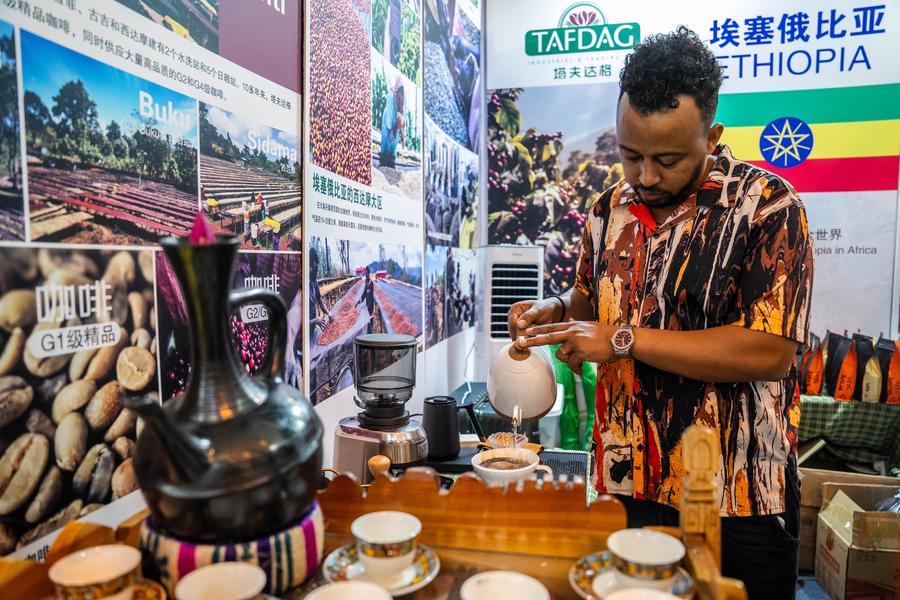KUNMING (XINHUA) – Daniel Yilak Bezabeh has been drinking coffee for years, but just recently he had his first experience of drinking a cup of espresso made by a robot.
The Ethiopian businessman had this impressive experience during his second visit to the China-South Asia Expo, which opened on Tuesday in Kunming, capital of southwest China’s Yunnan Province, the largest coffee-producing region in the country.
Hosted by the Ministry of Commerce and the provincial government, the six-day event features 15 exhibition halls and attracts over 2,000 exhibitors.
First held in 2013, the expo was once primarily a trade fair between China and South Asian countries. After more than a decade of development, it has expanded to an event with 82 countries, regions and international organisations participating, including countries from South Asia, Southeast Asia, East Asia and even Africa.
During Bezabeh’s first visit to the expo in 2019, the booth of his coffee export company was grouped with other industries. This year, a pavilion dedicated to the coffee industry has been established at the expo for the first time, with over 160 companies showcasing their products in this pavilion.

The coffee pavilion showcases an entire coffee industrial chain, ranging from roasting and processing to packaging, in 11 exhibition zones. It also features activities such as Yunnan coffee workshops and coffee brewing competitions, attracting over 400 professional buyers for trade and business negotiations.
Bezabeh said that the pavilion has effectively connected buyers and exhibitors in the coffee sector. He has reached a preliminary agreement with Yunnan State Farms Group Co, Ltd to sign a contract worth over USD100,000 for coffee beans.
In the pavilion, a robot capable of making quality latte art in 60 seconds caught the eyes of many visitors. Developed by Ding’s Coffee, a coffee plantation in Yunnan, the robot can make 10 types of coffee drinks, including Americano and espresso, and create intricate latte designs. It is expected to serve at least 20,000 cups of coffee during the expo.
Ding Zhi, founder of Ding’s Coffee, said that the robot has garnered interest from several Southeast Asian companies and government representatives, including a coffee procurement firm from Sri Lanka and a tech-agriculture company from Vietnam.
Many exhibitors and visitors at the expo believe that coffee has become an important link in fostering economic and trade cooperation between China and countries in South and Southeast Asia, among other regions.
Mahesh Thawalampola, a trader from Sri Lanka, said that in addition to daily necessities, they are also introducing high-quality Arabica beans from Sri Lanka to the expo for the first time.
“We hope they will appeal to Chinese consumers, so that we can expand to this promising market in China for more collaborations,” said Thawalampola.
Statistics from the Yunnan provincial department of agriculture and rural affairs show that the province now has over 1.27 million mu (about 84,666.67 hectares) of coffee plantations, producing more than 114,000 tonnes of raw coffee beans annually, both of which account for over 98 per cent of the country’s total.
With an annual comprehensive output value exceeding CNY41.8 billion yuan (about USD5.9 billion), Yunnan’s coffee industry has been evolving towards higher quality and premium products based on a complete coffee industrial chain.
In 2021, premium and deep-processed coffee in Yunnan represented eight per cent and 20 per cent of output, respectively. In 2023, these rates increased to 22.7 per cent and 56 per cent.
During the expo, a delegation of coffee companies from countries including Japan and Vietnam also visited the city of Pu’er in Yunnan, which features numerous coffee plantations in mountain forests, to explore collaboration opportunities.
The region’s coffee plantations, which have become popular tourist destinations, are seen as models for integrated agricultural and tourism development.
According to a recent report by the Shanghai Cultural and Creative Industry Promotion Association, China’s coffee industry reached a market size of CNY265.4 billion in 2023 and is expected to grow to CNY313.3 billion in 2024, with an annualised average growth rate of 17 per cent over the past three years.



















































